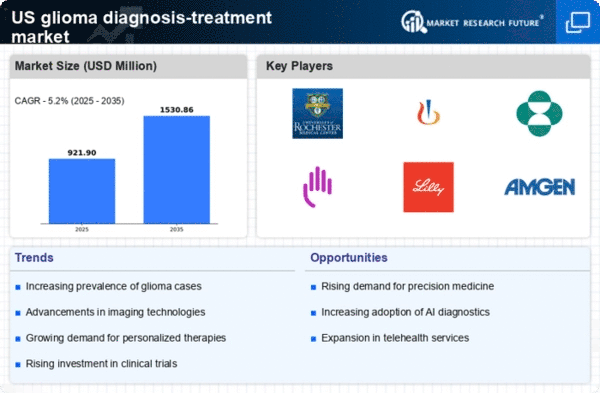The US Glioma Diagnosis and Treatment Market is characterized by a dynamic landscape, where various companies compete to offer innovative therapies and diagnostic solutions tailored to managing glioma, a type of brain tumor. This sector is marked by advancements in biotechnology, diagnostic imaging, and personalized medicine, as industry players strive to improve patient outcomes through cutting-edge research and development. As the prevalence of gliomas rises among the population, stakeholders are focusing on developing effective targeted therapies and enhancing diagnostic accuracy.
The market is witnessing a surge in collaborations, partnerships, and technological innovations aimed at streamlining treatment protocols and improving the overall clinical experience for patients.
Illumina has established itself as a leading player within the US Glioma Diagnosis and Treatment Market through its robust portfolio of genomic sequencing technologies specifically designed for cancer diagnostics and therapeutic monitoring. The company leverages its advanced next-generation sequencing capabilities to provide clinicians with valuable insights into the genetic makeup of gliomas, aiding in precise diagnoses and enabling personalized treatment plans. Illumina's strengths lie in its cutting-edge technology, which facilitates rapid and accurate genomic profiling, allowing for better-targeted therapies in clinical settings.
Additionally, the company's commitment to research innovation and ongoing collaborations with academic institutions and healthcare organizations further solidifies its presence in the market, focusing on enhancing patient care in glioma treatment.
Genentech, a significant player in the US glioma treatment landscape, offers a variety of products and services aimed at improving patient outcomes through advanced therapies. The company is renowned for its development of monoclonal antibodies and targeted therapies tailored for various cancers, including gliomas. Genentech's market presence is bolstered by its robust pipeline of therapeutics that focus on innovative treatment mechanics, aiming to maximize efficacy while minimizing side effects. Among its strengths is a strong emphasis on research and development, coupled with strategic mergers and acquisitions that amplify its resource base and scientific expertise.
This allows Genentech to forge ahead with novel treatments in the glioma space, reinforcing its market position while expanding access to innovative therapies for patients across the US.























